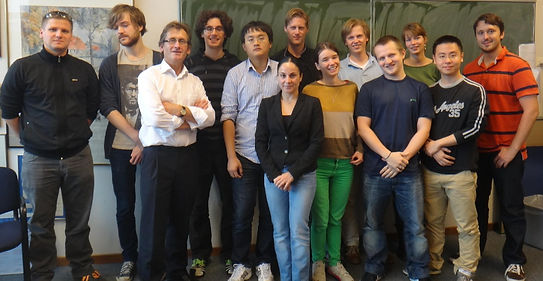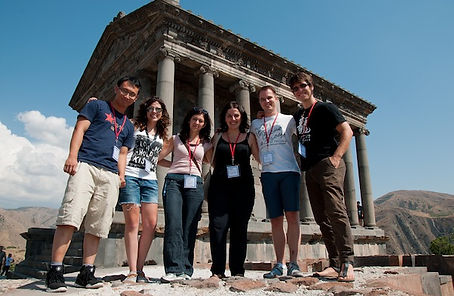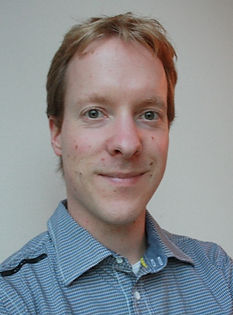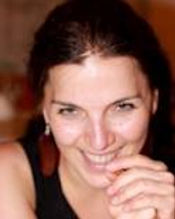Feringa-Harutyunyan-Otten-Barta joined Workweek 2014 2nd-5th of June 2014
Groups from Groningen
Prof. Ben L. Feringa
Ben L. Feringa received his Ph.D. degree from the University of Groningen in 1978 with professor Hans Wynberg on the topic of asymmetric phenol oxidation. He was a research scientist with Royal Dutch Shell from 1978 to 1984. He joined the department of chemistry at the University of Groningen in 1984 as a lecturer and was appointed full Professor at the same University in 1988. In 2003 he was appointed Jacobus H. van ´t Hoff Distinguished Professor of Molecular Sciences. His research interests focus on catalysis, the control of dynamic processes and the design of molecular systems which combine several molecular components working in concert to perform complex and integrated functions at different hierarchical levels. The current research program of the Feringa group includes organic synthesis, asymmetric catalysis and catalytic enantioselective total synthesis , molecular switches and motors, self-assembly, nanosystems and smart organic materials. Other interest include origin of chirality and biomimetic systems. His group has introduced monodentate phosphoramidites as priviliged chiral ligands in asymmetric catalysis, discovered catalytic asymmetric conjugate addition methodology and designed chiroptical molecular switches and unidirectional rotary molecular motors.

Prof. Syuzanna R. Harutyunyan
Syuzanna R. Harutyunyan is currently a tenured Associate Professor in Synthetic Organic Chemistry at the University of Groningen. Before joining the RUG, she carried out research in Armenia, Russia, Poland, Belgium, and in the Netherlands. She worked for two years as a senior scientist at Tibotec-JanssenPharmaceutica-J&J (Belgium). During her post-doctoral with Prof. Ben Feringa, her research led to the discovery of the first enantioselective catalytic methodologies using Grignard reagents, and revealed the mechanisms of these reactions and application of these methodologies in total synthesis of natural products. During her Ph.D. research under supervision of Prof. Yu. N. Belokon (Russia) she developed new strategies for enantioselective synthesis of amino acids in phase-transfer-conditions. The current research program of the Harutyunyan group includes organic synthesis and asymmetric catalysis, focusing the attention on auto-cross-catalysis and origin of homochirality, in order to design successful autocatalytic systems, and the development of multifunctional chiral catalysts for enantioselective synthesis.


Prof. Edwin Otten
Edwin Otten obtained his MSc and Ph.D. (2008) from the University of Groningen, The Netherlands. During his PhD research he studied the synthesis and reactivity of cationic early transition metal complexes with arene-substituted cyclopentadienyl ligands, and their application in ethylene trimerisation catalysis. Upon completion of his PhD he spent 2 years as a post-doctoral researcher in the laboratory of Prof. Doug Stephan at the University of Toronto (Canada), where he worked on small-molecule activation using Frustrated Lewis Pairs. After a year in an industrial R&D laboratory (SABIC Europe), Edwin returned to the University of Groningen in 2011 as an Assistant Professor of Molecular Inorganic Chemistry. His research interests include the chemistry of metal complexes with redox-active ligands and new strategies to CO2 conversion.

Prof. Katalin Barta
Katalin Barta studied chemistry and completed her master’s thesis at ELTE Budapest, under the supervision of Prof. István T. Horváth in fluorous biphase chemistry and at the University of Leeds in the use of supercritical CO2 for catalysis. She then moved to RWTH-Aachen, Germany, where she earned her Ph.D. with Prof. Walter Leitner in asymmetric catalysis. She then carried out post-doctoral research with Prof. Peter Ford at the University of California, Santa Barbara and was Associate Research Scientist at Yale University, Center for Green Chemistry. Her post-doctoral work focused on the development of highly efficient conversion of lignocellulosic biomass with non-noble metal based heterogeneous catalysts. She is currently Assistant Professor of Green and Sustainable Chemistry at the University of Groningen where her research primarily focuses on biomass conversion using both homogeneous as well as heterogeneous catalysts. Research directions include the conversion of lignocelluloses to clean liquid fuels as well as mild and controlled depolymerization of lignin to aromatics. The group also develops new, non-noble metal based catalytic methodologies for hydrogen auto transfer reactions, hydrogenations, asymmetric hydrogenations and bond cleavage.



